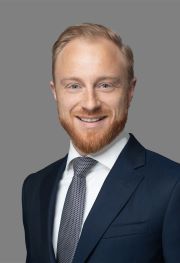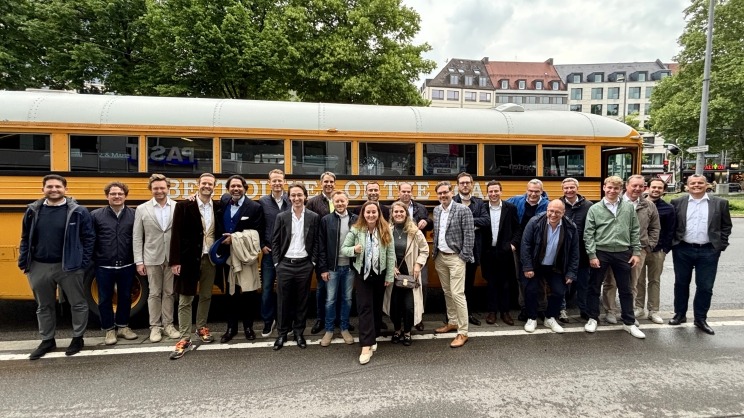Welcome Back Spotlight: Michael Larem

A Senior Director’s Insights on Rejoining a Former Employer and the Importance of Nurturing Your Professional Network
Michael Larem is a Senior Director in the North American Restructuring & Turnaround (NACR) practice in Atlanta, Georgia. He earned his bachelor’s degree from the Frankfurt School of Finance and Management and his master’s degree from Emory University.
In this Q&A, Michael discusses his return to A&M after a personal move to Germany, highlighting the firm's unique camaraderie and his growth through mentorship. He reflects on balancing work and family life, the impact of his international experiences and the parallels between tennis and restructuring in terms of work ethic and competitive spirit.
What prompted your return to the firm and how did these factors shape your decision to continue your consulting career?
My decision to leave A&M at the beginning of 2023 was for personal reasons and primarily driven by my family moving to Germany, where I grew up. I wanted to try something different and find out if I could establish myself anew in a different market without the safety net of my background with the firm. After nearly a decade of positive experiences at A&M, I didn’t fully appreciate how many of the things I valued at A&M wouldn’t be replicated elsewhere. By the time my family and I realized we wanted to return to the U.S., coming back to A&M was the obvious choice—it was like returning to the home team.
Reflecting on your time at A&M, can you highlight the skills you developed or gained and how they contribute to your current role?
Having spent most of my professional career with A&M and NACR, I’ve gained extensive experience, from technical skills to leading engagements. Perhaps what has become most meaningful to me—though it didn’t come naturally at first—is the ability to develop junior staff and help my team members grow. I’ve been fortunate to receive significant support from my mentors over the years, and giving back is extremely rewarding.
What specific factors, including aspects of A&M's culture or opportunities, played a crucial role in influencing your decision to return to the firm?
The A&M culture, along with the connections I formed in my time with the firm, played the biggest role in my return. I can recall my wife commenting at one of the first holiday events after I first joined A&M in 2015, that the evening didn’t feel like a corporate or work event and she genuinely enjoyed meeting everyone. I can’t say that about every company I’ve worked for, but A&M has consistently stood out to me for its exceptional sense of camaraderie. Like what you do and who you do it with really holds true.
Leveraging Mentors and Building Relationships Effectively
Who are your closest mentors, what important lessons have you learned from them, and what role did they play in your return to A&M?
This question is particularly difficult as I’ve had many great teachers, mentors and friends in my career, and I always try to learn something from every person I work for and with. One of the mentors I stayed in touch with and who helped me think through the return both to the US and A&M is Mark Roberts, a Managing Director within NACR. We stayed in touch regularly during my absence and he as well as others always made me feel like the door is open to come back.
Share your approach to building and maintaining relationships with colleagues and clients. How do these relationships enhance your effectiveness and success in your current role?
Restructuring is a relationship business—both from a business development standpoint but also in terms of day-to-day work as we work with clients and, more importantly, people that are going through difficult situations. Being empathetic and understanding what is important to our client counterparts is critical for success, whether that means playing the role of listener or providing the wake-up call on something a client doesn’t want to hear. In the end, I believe it is all about being authentic and working with our clients and co-advisors as individuals.
Based on your experience, what advice or insights would you offer to professionals considering a return to A&M or rejoining a former employer?
I would recommend carefully considering the reasons for leaving in the first place. Everyone’s situation is unique, and in my case, I was completely satisfied and wouldn’t have thought about leaving A&M if my family hadn’t relocated to a different country.
Maintaining a Work-Life Balance in Consulting
How do you balance the demands of consulting with maintaining a healthy work-life balance, and what strategies do you employ to ensure personal and professional fulfillment?
I have a strong partnership with my wife, which allows me to work and travel as needed while ensuring things are taken care of at home. We’ve consciously chosen for me to pursue this career, and although it can be challenging at times, it has been rewarding for us. At A&M, there is an understanding that work can be demanding on live deals, but when there are no urgent client demands, there is a great culture of taking time off. Face time for the sake of face time is non-existent at the firm at any level, so a key factor for me is making the most of my time with my wife and two children when I’m not working on an active deal.
What strategies have you found most effective in transitioning between various roles and geographic locations throughout your career?
I believe a lot can be achieved with openness, mutual respect and a willingness to adapt to different circumstances or approaches.
Could you describe how your experience in both German- and English-speaking environments has shaped your approach to client relations and teamwork in your current role?
This question is a bit challenging to answer because my recent experience in Germany involved stakeholders from diverse backgrounds, including a client C-suite with representatives from at least five different nationalities, as well as external stakeholders from the U.K., U.S. and Germany. I believe it’s less about whether the environment is German- or English-speaking and more about the complexities of each company, management team and problem.
Can you share how your international upbringing, from Frankfurt to England to Atlanta, influenced your career path in consulting and restructuring?
I can’t say that my international upbringing influenced my decision to pursue restructuring though I believe it has helped me be adaptable and able to appreciate different perspectives and ways of thinking. My first exposure to the industry and to A&M came during my MBA program at Emory. After working in consulting for a few years post-university, I was intrigued by restructuring's promise of a faster-paced, dynamic and uncertain environment that seemed highly rewarding. This interest has only grown, and it remains what I enjoy doing.
Given your passion for competing in tennis and your career in restructuring, how do you find parallels between the strategic thinking and agility required on the court and those needed in navigating complex consulting projects?
For me, the biggest parallels between competing in sports and restructuring are the work ethic and competitive spirit they both demand. In tennis, improving your game requires hours of hard work outside of actual matches, including speed and agility drills, mobility exercises and facing opponents who challenge you. Similarly, in restructuring, progress comes from a willingness to put in the effort, even when it's not glamorous, and to challenge yourself with increasingly complex deals to enhance your skills.




